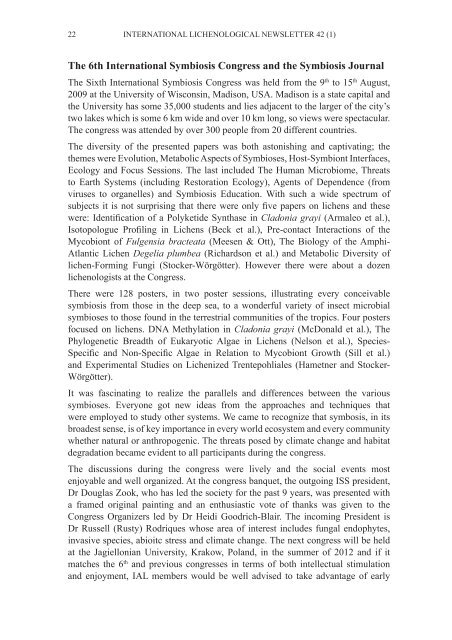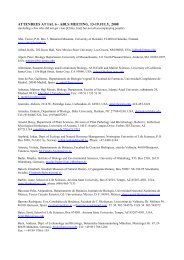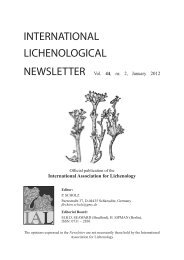international lichenological - International Association for Lichenology
international lichenological - International Association for Lichenology
international lichenological - International Association for Lichenology
Create successful ePaper yourself
Turn your PDF publications into a flip-book with our unique Google optimized e-Paper software.
22 INTERNATIONAL LICHENOLOGICAL NEWSLETTER 42 (1)<br />
The 6th <strong>International</strong> Symbiosis Congress and the Symbiosis Journal<br />
The Sixth <strong>International</strong> Symbiosis Congress was held from the 9th to 15th August,<br />
2009 at the University of Wisconsin, Madison, USA. Madison is a state capital and<br />
the University has some 35,000 students and lies adjacent to the larger of the city’s<br />
two lakes which is some 6 km wide and over 10 km long, so views were spectacular.<br />
The congress was attended by over 300 people from 20 different countries.<br />
The diversity of the presented papers was both astonishing and captivating; the<br />
themes were Evolution, Metabolic Aspects of Symbioses, Host-Symbiont Interfaces,<br />
Ecology and Focus Sessions. The last included The Human Microbiome, Threats<br />
to Earth Systems (including Restoration Ecology), Agents of Dependence (from<br />
viruses to organelles) and Symbiosis Education. With such a wide spectrum of<br />
�����������������������������������������������������������������������������������<br />
������������������������������������������������Cladonia grayi (Armaleo et al.),<br />
������������� ��������� ��� �������� ������ ��� ������ ������������ ������������� ��� ����<br />
Mycobiont of Fulgensia bracteata (Meesen & Ott), The Biology of the Amphi-<br />
Atlantic Lichen Degelia plumbea (Richardson et al.) and Metabolic Diversity of<br />
lichen-Forming Fungi (Stocker-Wörgötter). However there were about a dozen<br />
lichenologists at the Congress.<br />
There were 128 posters, in two poster sessions, illustrating every conceivable<br />
symbiosis from those in the deep sea, to a wonderful variety of insect microbial<br />
symbioses to those found in the terrestrial communities of the tropics. Four posters<br />
focused on lichens. DNA Methylation in Cladonia grayi (McDonald et al.), The<br />
Phylogenetic Breadth of Eukaryotic Algae in Lichens (Nelson et al.), Species-<br />
�������� ���� ������������ ������ ��� ��������� ��� ���������� ������� ������ ��� �����<br />
and Experimental Studies on Lichenized Trentepohliales (Hametner and Stocker-<br />
Wörgötter).<br />
It was fascinating to realize the parallels and differences between the various<br />
symbioses. Everyone got new ideas from the approaches and techniques that<br />
were employed to study other systems. We came to recognize that symbosis, in its<br />
broadest sense, is of key importance in every world ecosystem and every community<br />
whether natural or anthropogenic. The threats posed by climate change and habitat<br />
degradation became evident to all participants during the congress.<br />
The discussions during the congress were lively and the social events most<br />
enjoyable and well organized. At the congress banquet, the outgoing ISS president,<br />
Dr Douglas Zook, who has led the society <strong>for</strong> the past 9 years, was presented with<br />
a framed original painting and an enthusiastic vote of thanks was given to the<br />
Congress Organizers led by Dr Heidi Goodrich-Blair. The incoming President is<br />
Dr Russell (Rusty) Rodriques whose area of interest includes fungal endophytes,<br />
invasive species, abioitc stress and climate change. The next congress will be held<br />
at the Jagiellonian University, Krakow, Poland, in the summer of 2012 and if it<br />
matches the 6 th and previous congresses in terms of both intellectual stimulation<br />
and enjoyment, IAL members would be well advised to take advantage of early






